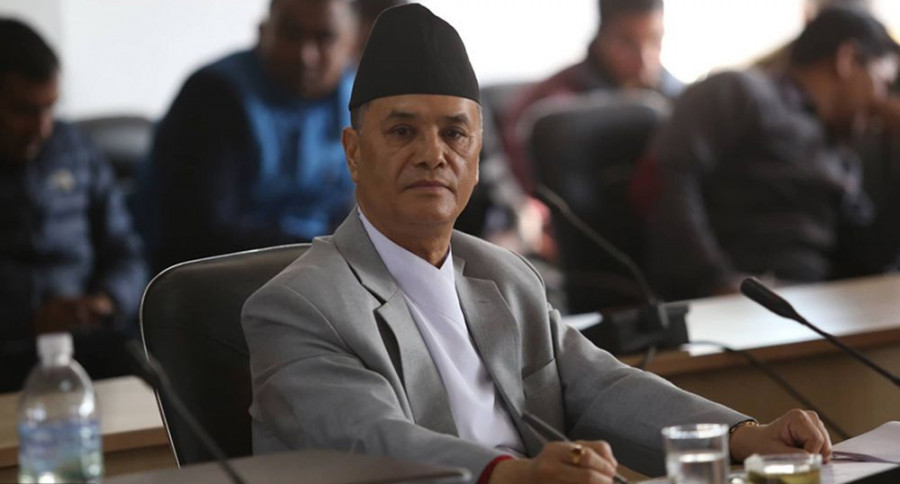National
Chief Justice Rana to reconstitute Constitutional Bench with justices on seniority basis
After Bam Kumar Shrestha and Tej Bahadur KC refuse to recuse, Deepak Kumar Karki and Ananda Mohan Bhattarai leave the bench. Hearing on House dissolution to start on June 6 with a new set of justices.
Post Report
After a hullabaloo over the composition of the Constitutional Bench Chief Justice Cholendra Shumsher Rana has agreed to reconstitute it on the basis of seniority.
After holding a meeting with the Supreme Court Bar Association, Rana decided to reconstitute the bench and announced that hearing on petitions against House dissolution would resume on June 6 with a new set of justices.
Lawyers pleading on behalf of the plaintiffs had expressed reservations about the presence of Justices Bam Kumar Shrestha and Tej Bahadur KC and demanded that the two recuse themselves from the hearing. But both refused. Instead, Justices Deepak Kumar Karki and Ananda Mohan Bhattarai decided not to be part of the bench, opposing Shrestha and KC’s decision not to recuse despite questions raised against them.
“For the independence and neutrality of this court, we felt that it would be appropriate if the justices recuse themselves from the hearing of the case (House dissolution),” states the joint opinion of Justices Karki and Bhattarai. “Our knowledge and judicial ritual do not allow us to say that the debate presented in front of us has no connection with the 075-wo-0517 case.”
The case they referred to is the Supreme Court verdict of March 7 which invalidated the Nepal Communist Party (NCP) and revived the CPN-UML and the Communist Party of Nepal (Maoist Centre).
Shrestha was one of the justices of the two-member bench which passed the verdict on March 7. KC, on the other hand, was part of another bench led by Chief Justice Rana, which had on April 1 rejected Maoist Centre chair Pushpa Kamal Dahal’s petition against the March 7 decision.
Arguments and counterarguments over the composition of the bench had hobbled the hearing.
After questions continued for three days over the composition, the bench on Monday decided to hold a discussion on the way forward, but failed to reach any conclusion.
The Supreme Court Bar Association, led by its chair Purna Man Shakya, on Tuesday suggested that the chief justice reconstitute the bench so as to steer clear of any further doubts over the independence of the judiciary.
“The chief justice has agreed to form every Constitutional Bench on the basis of seniority and for that the existing regulation will be amended,” said Shakya following the meeting of a delegation of the Supreme Court Bar Association with Chief Justice Rana. “If there is any conflict of interest or health issue, a justice next to him or her in seniority can come to the bench.”
According to constitutional provisions, the chief justice leads the Constitutional Bench. The chief justice can appoint four from a roster of justices to form the bench.
There are currently 13 Supreme Court justices, including Chief Justice Rana on the roster. Justice Purushottam Bhandari retired last week.
There is no hard and fast rule on picking the justices for the bench on the basis of their seniority, but experts say in general it is expected that the justices as per their order of precedence are usually chosen.
Article 137 (1) of the constitution states that there shall be a Constitutional Bench in the Supreme Court and the Constitutional Bench shall consist of the chief justice and four justices designated by the chief justice on the recommendation of the Judicial Council.
Rana on Friday constituted the bench with Justices Deepak Kumar Karki, Ananda Mohan Bhattarai, Tej Bahadur KC and Bam Kumar Shrestha.
Shrestha ranks 12th when it comes to seniority.
Lawyers initially had, however, questioned Shrestha’s presence not because of his seniority but because he was one of the two justices of the bench that on March 7 invalidated the Nepal Communist Party (NCP) and revived the CPN-UML and the Communist Party of Nepal (Maoist Centre). Lawyers argued that Shrestha’s presence constituted a conflict of interest, which Chief Justice Rana, however, did not agree with.
Lawyers then expressed reservations about Rana and KC’s presence also, because a bench comprising the duo on April 1 had rejected Maoist Centre chair’s petition against the March 7 decision.
Shakya said the ongoing conflict will be resolved and the hearing would continue once the regulation is amended.
According to Shakya, the amendment proposal on Constitutional Bench Operation Regulation for constituting the bench on the seniority basis will be taken to the full court on Wednesday.
Once the regulation is amended, the bench should consist of Chief Justice Rana, Deepak Kumar Karki, Mira Khadka, Hari Krishna Karki and Bishwambhar Prasad Shrestha.
Since Karki cannot be part of the bench for the same reason he had recused last time while hearing the December 20 House dissolution and Shrestha is in isolation, Ishwor Prasad Khatiwada and Ananda Mohan Bhattarai, who are right below them in seniority, would have to be in the bench.
During the hearing of cases against December 20 House dissolution, questions were raised if Karki could be in the bench because he had served as attorney general in the past during Oli’s first stint as prime minister. After Karki recused himself, Sapana Pradhan Malla was roped in.
The Constitutional Bench comprising Rana, Bishowambhar Shrestha, Sapana Pradhan Malla and Tej Bahadur KC had on February 23 overturned Oli’s December 20 House dissolution.
The Supreme Court is now once again examining Oli’s second House dissolution in less than six months.
As many as 30 petitions, including the one by the opposition alliance, have been filed.




 13.12°C Kathmandu
13.12°C Kathmandu













